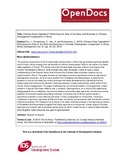| dc.contributor.author | Gu, Jing | |
| dc.contributor.author | Zhang, Chuanhong | |
| dc.contributor.author | Vaz, Alcides | |
| dc.contributor.author | Langton, Mukwereza | |
| dc.date.accessioned | 2019-02-21T16:41:23Z | |
| dc.date.available | 2019-02-21T16:41:23Z | |
| dc.date.issued | 2016-02-13 | |
| dc.identifier.citation | Gu, J.; Chuanhong, Z.; Vaz, A. and Mukwereza, L. (2016) 'Chinese State Capitalism? Rethinking the Role of the State and Business in Chinese Development Cooperation in Africa', World Development 81,:24–34 | en |
| dc.identifier.uri | https://opendocs.ids.ac.uk/opendocs/handle/20.500.12413/14362 | |
| dc.description.abstract | The growing involvement of the Chinese state and business in Africa has generated significant debate about China’s Africa strategy and the benefits for Africa’s development. What is the nature of Chinese state capitalism in Africa? This study examines Chinese state–business relations and argues that China’s involvement in Africa is more complex than often portrayed. It aims to build a closer understanding of the diverse factors that influence the Chinese state–business relations as it is implemented in Africa. This paper focuses on how state–business interactions influence agricultural development outcomes, using six case-studies from Zimbabwe and Mozambique. It explores the question of how far the state can control business and direct development by identifying the key relationships that influence the decision-making processes of state and business actors within China and its African engagement. The paper challenges the conventional wisdom of homogenized, unitary relations. It argues that these relations are, in practice, heterogeneous, as a result of the state being disaggregated into a multiplicity of provincial relations and central state agencies, and tensions arising between commercial market and political interests. The active role of African governments in agricultural schemes is also affecting outcomes. China’s engagement is multivariate, involving a multiplicity of agencies, operating at different levels, structures, and processes with sometimes contrary interests and goals. The findings of an analysis of six state–business projects in the agricultural sectors of Zimbabwe and Mozambique suggest that where agriculture is concerned, a wide range of Chinese agencies are involved, with businesses being driven by either market forces or national state interests, which together make outcomes less open to generalization. | en |
| dc.description.sponsorship | UK Economic and Social Research Council | en |
| dc.language.iso | en | en |
| dc.publisher | Elsevier | en |
| dc.relation.ispartofseries | World Development;Vol. 81, pp. 24–34 | |
| dc.rights.uri | http://creativecommons.org/licenses/by-nc-nd/4.0/ | en |
| dc.subject | Economic Development | en |
| dc.title | Chinese State Capitalism? Rethinking the Role of the State and Business in Chinese Development Cooperation in Africa | en |
| dc.type | Article | en |
| dc.rights.holder | © 2016 The Authors. Published by Elsevier Ltd. | en |
| dc.identifier.externaluri | https://www.sciencedirect.com/science/article/pii/S0305750X15301625 | en |
| dc.identifier.doi | 10.1016/j.worlddev.2016.01.001 | |
| rioxxterms.funder | Default funder | en |
| rioxxterms.identifier.project | China and Brazil in African Agriculture | en |
| rioxxterms.version | VoR | en |
| rioxxterms.versionofrecord | https://doi.org/10.1016/j.worlddev.2016.01.001 | en |
| rioxxterms.funder.project | a1a0e9a9-2ad8-497d-944e-c3a90ac53231 | en |


